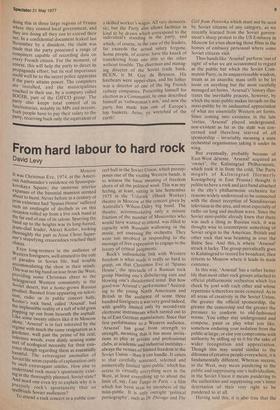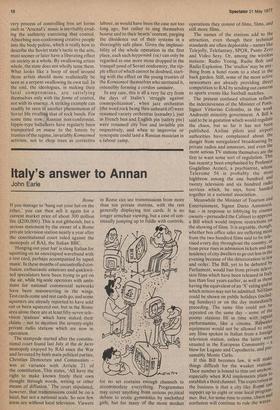From hard labour to hard rock
David Levy
Moscow It was Christmas Eve, 1974, at the American Ambassador's residence on Spassopeskovskaya Square; the immense interior expanses of the baronial mansion seemed about to burst. Never before in a century of Prim existence had `Spasso House' suffered such an onslaught of decibels as on this occasion rolled up from a live rock band at the far end of one of its salons. Spurring the band up to the heights was its long-haired, jeans-clad leader, Alexei Kozlov, looking thoroughly the part as Jesus Christ Superstar's stupefying crescendoes reached their Climax, Even long-termers in the audience of Western foreigners, well attuned to the rule of paradox in Soviet life, had trouble ,,aceornmodating the show in their minds. 1 his was no big band on tour from the West, Providing some Christmas cheer to the beleaguered Western community in the Soviet desert, but a home-grown Russian Product. Banned from appearing on television,, radio or in public concert halls, Kozlov's rock band, called 'Arsenal', had the implausible reality of a tuft of wild grass PLo.PPing up out from beneath the asphalt. Ike some twenty others like it in Moscow alone, 'Arsenal' is in fact tolerated by the regime with much the same resignation as a gardener, well past the prime of his zeal, tolerates weeds, even dimly sensing some s°rt of ecological necessity for their existence though regarding them as essentially harmful. The extravagant anomalies of
by life seem capable of explanation only py such extravagant similes. How else to understand rock music's spontaneity existing in the thoroughly planned, Soviet state? And need one even try to explain why it is Precisely rock's spontaneity that so spellbinds Soviet audiences?
To attend a rock concert in a public con cert hall in the Soviet Union, which presupposes one of the visiting Western bands, is to witness the basic meaning of freedom , shorn of all the political wool. This was my feeling, at least, sitting in late September 1975 in the 'Udarnik' (Shock Worker) theatre in Moscow at the concert given by Australia's Wilson-Daley big band. The theatre, accommodating only a minute fraction of the number of Muscovites who would have wanted to attend, was filled to capacity with Russians wallowing in the music, not assessing the orchestra. They were too involved in responding to the message of free expression to engage in the luxury of critical judgments. Rock's indissoluble link with Western freedom is what made it really so hard to grasp, on that Christmas Eve at `Spasso House', the spectacle of a Russian rock group blasting one's disbelieving ears and blowing one's disinformed mind. But how good was 'Arsenal's' performance? According to the young North Americans and British in the audience of some three hundred foreigners it was very good indeed, with quality limited only by second-rate electronic instruments which turned out to be of East German manufacture. Since that first performance to a Western audience, 'Arsenal' has gone from strength to strength, meaning that it has more invitations to play at private and professional clubs, at academic and industrial institutes — always the venues of limited freedom in the Soviet Union — than it can handle. It caters to that carefully screened, selected and numerically limited 'mini-public' which has access to virtually everything seen in the West, at least everything up to about the limit of, say, Last Tango in Paris — a film which has been seen by members of the mini-public. It is only outright 'political pornography', such as Dr Zhivago and The
Girl from Petrovka which must not be seen by Soviet citizens of any category, as we recently learned from the Soviet government's sharp protest to the US Embassy in Moscow for even showing those films in the homes of embassy personnel where some Soviet citizens visit.
Thus bands like 'Arsenal' perform 'out of sight' of what we are accustomed to regard as the public but which the Soviet Communist Party, in its unquestionable wisdom, treats as an anarchic mass unfit to be let loose on anything but the most carefully managed art forms. 'Arsenal's' history illustrates the inevitable process, however, by which the mini-public makes inroads on the maxi-public by its undaunted appreciation of what are essentially Western art forms. Since coming into existence in the late 'sixties, 'Arsenal' played underground, non-existent as far as the state was concerned and therefore' starved of all sponsorship — invariably meaning a state orchestral organisation taking it under its wing.
But eventually, probably because of East-West détente, 'Arsenal' acquired an 'owner', the Kaliningrad Philharmonic, which took it in from the cold. The Party moguls of Kaliningrad (formerly Koenigsberg in East Prussia) thought it politic to have a rock and jazz band attached to the city's philharmonic orchestra for reasons widely understood to be connected with the direct reception of Scandinavian television in the area, and most especially of radio on long and medium wave. Since the Soviet mini-public already knew that there was such a thing as Russian rock, it was thought wide to counterpose something of Soviet origin to the American, British and other rock that was beaming in over the Baltic Sea. And this, is where 'Arsenal' struck it lucky. The group periodically goes to Kaliningrad to record for broadcast, then returns to Moscow where it leads its main existence.
In this way, 'Arsenal' has a rather better life than most other rock groups attached to official philharmonic orchestras which live cheek by jowl with each other and whose repertoire is therefore more censored. As in all areas of creativity in the Soviet Union, the greater the official sponsorship, the greater the censorship and the greater the pressure to conform to old-fashioned norms. You either stay underground and compose, paint or play what you like, somehow enduring your isolation from the public at large; or else you compromise with authority by sidling up to it for the sake of wider recognition and appreciation. Though this may sound similar to the dilemma of creative people everywhere, it is fundamentally different. Whereas success, in the West, may mean pandering to the public and suppressing one's individualism, in the Soviet Union it means pandering to the authorities and suppressing one's inner detestation of their very right to be pandered to at all.
Having said this, it is also true that the
very process of controlling free art forms such as 'Arsenal's' music is inevitably eroding the authority exercising that control. Absorbing non-conforming creative people into the body politic, which is really how to describe the Soviet state's tactic in the arts, must sooner or later have a liberating effect on society as a whole. By swallowing artists whole, the state does not wholly tame them. What looks like a hoop of steel around those artists should more realistically be seen as a serpent swallowing its own tail. In the end, the ideologues, in making their fatal compromises, are satisfying themselves only with the forms of control, not with its essence. A striking example can readily be seen in another phenomenon of Soviet life rivalling that of rock bands. For some time now, Russian. non-conformist, hippie-type balladeers have regularly been transported en masse to the forests by trusties of the regime, invariably Komsomol activists, not to chop trees as corrective labour, as would have been the case not too long ago, but rather to sing themselves hoarse and to their hearts' content, purging the dissidence out of their systems in a thoroughly safe place. Given the implausibility of the whole operation in the first place, each such heppenink (sic) can only be regarded as one more stone dropped in the tranquil pond of Soviet conformity, the ripple effect of which cannot be doubted, starting with the effect on the young trusties of the Komsomol themselves who surround it, ostensibly forming a cordon sanitaire.
In any case, this is all a very far cry from the days of Stalin's 'struggle against cosmopolitanism', when jazz orchestras (the word rock being then unheard of) were renamed variety orchestras (estradny), just as French bun and English pin (safety pin) were renamed city bun and invisible pin respectively, and when to improvise or syncopate could land a Russian musician in
a labour camp. •



































 Previous page
Previous page